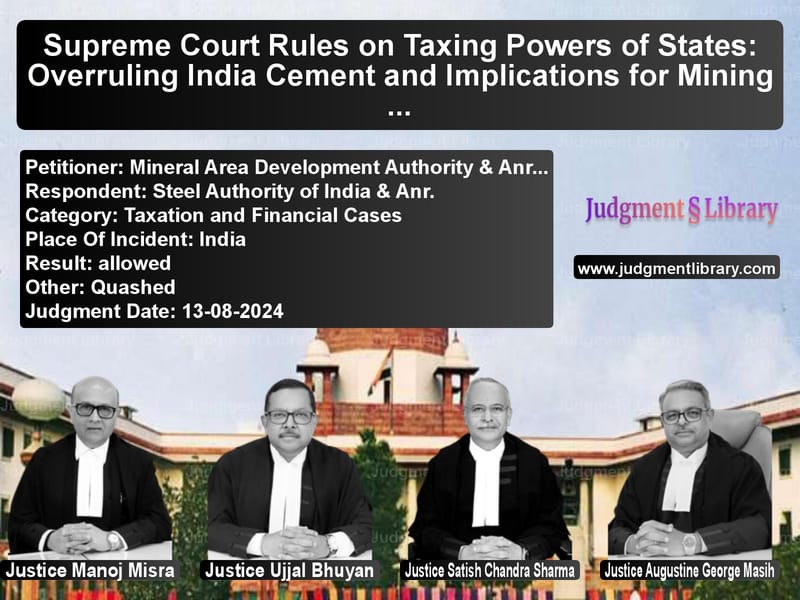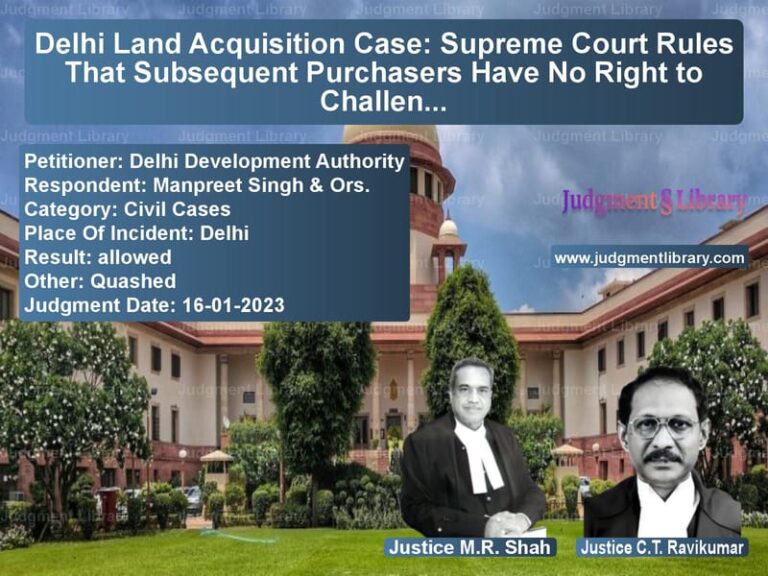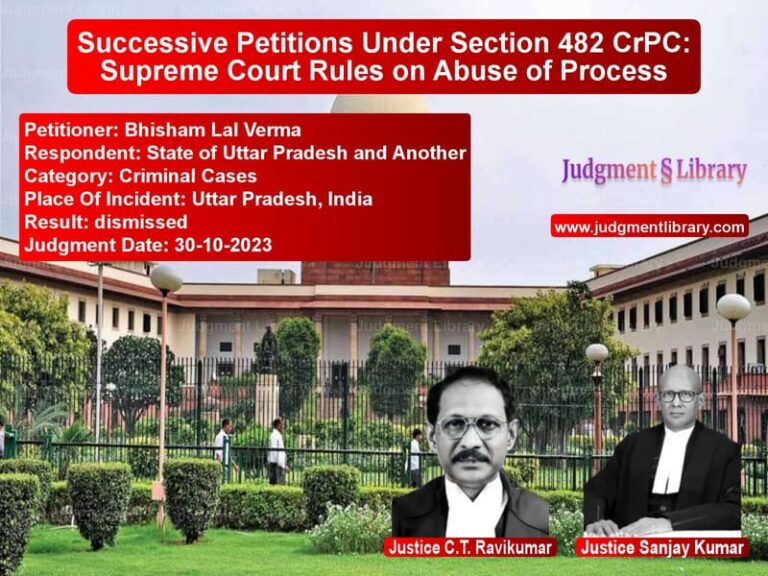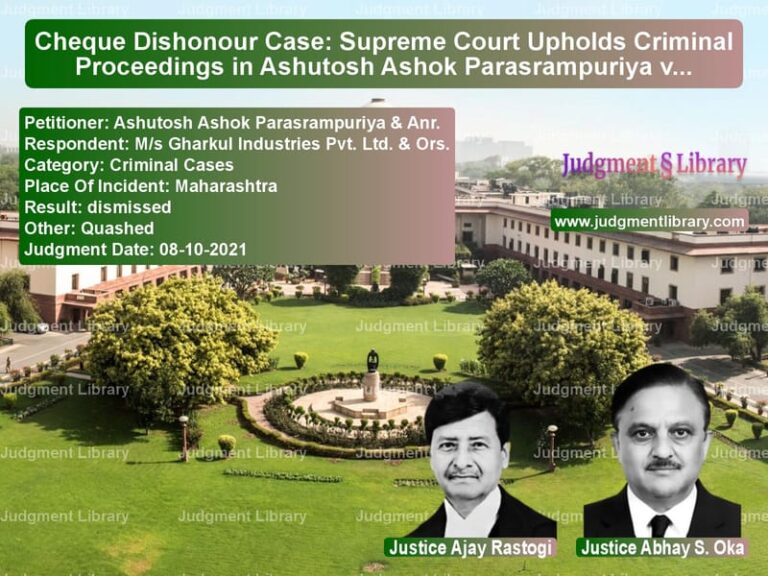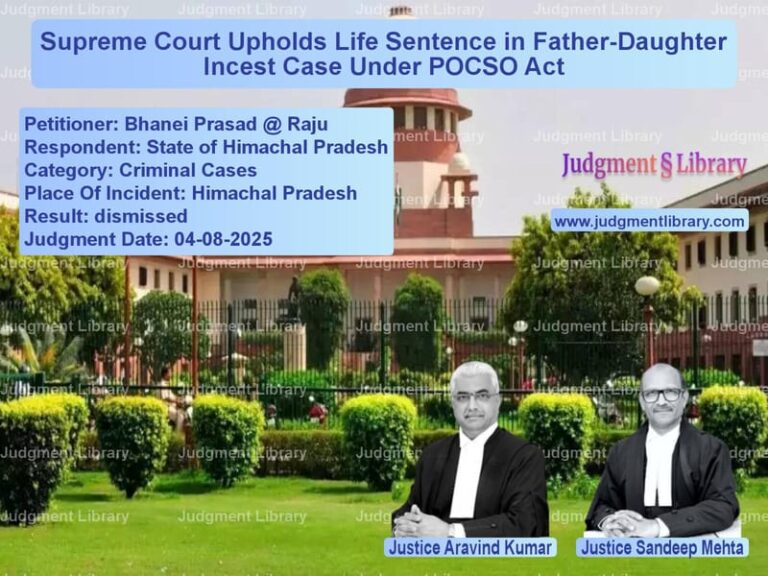Supreme Court Rules on Taxing Powers of States: Overruling India Cement and Implications for Mining Companies
The Supreme Court of India has delivered a landmark ruling in Mineral Area Development Authority & Anr. vs. Steel Authority of India & Anr., clarifying the powers of state legislatures to levy taxes on mineral rights and overruling the long-standing precedent set by India Cement Ltd. vs. State of Tamil Nadu. The decision has far-reaching implications for mining companies, state governments, and the interpretation of constitutional taxation powers.
The Court upheld the validity of state legislation imposing taxes on mining rights but provided relief to industries by limiting retrospective tax demands. The ruling ensures that industries are not burdened with retrospective financial liabilities while confirming the state’s authority to tax mineral activities.
Background of the Case
The dispute centered on whether state governments had the constitutional power to levy taxes on mining rights under Entries 49 and 50 of List II in the Seventh Schedule of the Constitution. The key developments leading to the case are:
- 1990: The Supreme Court ruled in India Cement Ltd. vs. State of Tamil Nadu that royalty on minerals was a tax, restricting state governments from imposing additional levies.
- 2004: The Constitution Bench in Kesoram Industries Ltd. vs. State of West Bengal ruled that royalty was not a tax, allowing states more discretion.
- 2015-2020: Multiple states enacted tax laws on mineral rights, leading to conflicting High Court rulings.
- 2024: The Supreme Court took up the matter to resolve the conflicting interpretations of taxation power.
Legal Issues Considered
The Supreme Court examined the following key issues:
- Did states have the constitutional authority to levy taxes on mining rights?
- Should the new ruling apply retrospectively or prospectively?
- How should the financial liabilities of industries be balanced against state revenue needs?
Arguments by the Petitioner (Mineral Area Development Authority)
The state governments and their agencies, represented by Attorney-General R. Venkataramani, Solicitor-General Tushar Mehta, and Senior Advocates Harish Salve, Mukul Rohatgi, and Abhishek Manu Singhvi, argued:
- India Cement had wrongly classified royalty as a tax, restricting legitimate state taxation powers.
- For over 30 years, industries benefited from not paying taxes that should have been legally due.
- Applying the ruling retrospectively would allow states to recover lost revenues.
Arguments by the Respondent (Steel Authority of India & Others)
The affected industries, represented by Senior Counsel Rakesh Dwivedi, Vijay Hansaria, and Tapesh Kumar Singh, countered:
- Businesses structured their operations based on the India Cement ruling.
- Retrospective taxation would unfairly burden companies that had already priced minerals based on past tax structures.
- The ruling should apply only prospectively to ensure economic stability.
Supreme Court’s Observations
1. States Have Legislative Competence
The Court ruled that states had the constitutional authority to impose taxes on mineral rights.
“The interpretation of taxation powers must be in line with federal principles, ensuring states have financial autonomy.”
2. Retrospective Taxation Could Harm Industries
The Court acknowledged that retrospective taxation could destabilize businesses.
“Rewriting past commercial arrangements by allowing retrospective tax demands would be inequitable and disruptive.”
3. Balancing State Revenue and Industry Stability
The Court sought a middle ground:
“While states can levy taxes, demands cannot be raised for periods before 1 April 2005, and interest on past dues must be waived.”
Final Judgment
The Supreme Court ruled:
- The ruling applies prospectively, not affecting taxes before 1 April 2005.
- States can levy and collect taxes on mineral rights but cannot impose interest and penalties on dues before 25 July 2024.
- Payments for tax demands must be staggered over twelve years starting April 2026.
Implications of the Judgment
The ruling has significant implications for taxation and industry:
- Clarifies Taxation Power: States can now impose taxes on mineral rights, resolving decades of uncertainty.
- Provides Relief to Industries: Limits the financial impact of retrospective taxation.
- Ensures Federal Balance: Reinforces states’ financial autonomy while protecting businesses.
- Encourages Predictable Tax Policy: Strengthens investor confidence in India’s regulatory framework.
The Supreme Court’s decision in Mineral Area Development Authority vs. Steel Authority of India is a landmark ruling that balances constitutional taxation powers with economic stability, ensuring fairness for both states and industries.
Petitioner Name: Mineral Area Development Authority & Anr..Respondent Name: Steel Authority of India & Anr..Judgment By: Justice Dhananjaya Y Chandrachud, Justice Hrishikesh Roy, Justice Abhay S Oka, Justice J B Pardiwala, Justice Manoj Misra, Justice Ujjal Bhuyan, Justice Satish Chandra Sharma, Justice Augustine George Masih.Place Of Incident: India.Judgment Date: 13-08-2024.
Don’t miss out on the full details! Download the complete judgment in PDF format below and gain valuable insights instantly!
Download Judgment: mineral-area-develop-vs-steel-authority-of-i-supreme-court-of-india-judgment-dated-13-08-2024.pdf
Directly Download Judgment: Directly download this Judgment
See all petitions in Income Tax Disputes
See all petitions in GST Law
See all petitions in Tax Refund Disputes
See all petitions in Judgment by Dhananjaya Y Chandrachud
See all petitions in Judgment by Hrishikesh Roy
See all petitions in Judgment by Abhay S. Oka
See all petitions in Judgment by J.B. Pardiwala
See all petitions in Judgment by Manoj Misra
See all petitions in Judgment by Ujjal Bhuyan
See all petitions in Judgment by Satish Chandra Sharma
See all petitions in Judgment by Augustine George Masih
See all petitions in allowed
See all petitions in Quashed
See all petitions in supreme court of India judgments August 2024
See all petitions in 2024 judgments
See all posts in Taxation and Financial Cases Category
See all allowed petitions in Taxation and Financial Cases Category
See all Dismissed petitions in Taxation and Financial Cases Category
See all partially allowed petitions in Taxation and Financial Cases Category

